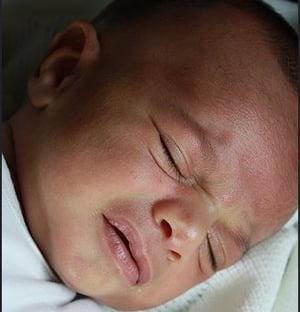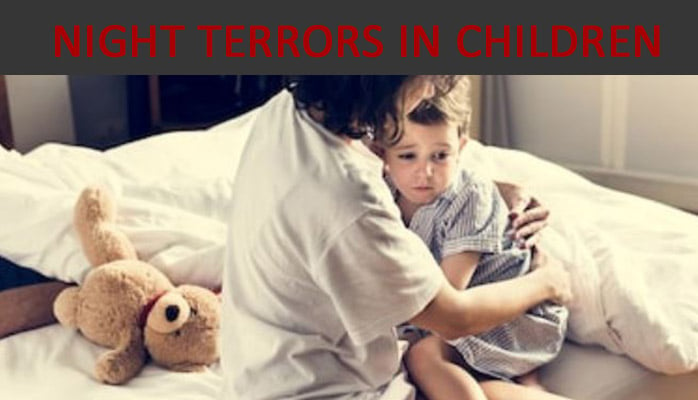Have you ever witnessed your child or spouse's nightmare or night terror? It may have been just as scary for you as it was for them. The words "helpless" and "heartbreaking" are often used to describe these episodes. Being able to distinguish the difference between a nightmare and a night terror will help you better understand what is happening with your loved one and how you can help. Here are the differences between night terrors and nightmares.
What are Nightmares
We’ve all had nightmares, and it’s pretty clear what they are: vivid dreams that cause feelings of fear, terror, anxiety, etc. Especially vivid or terrifying nightmares usually result in abruptly awakening from REM sleep with distinct memories of the dream. Returning to sleep after these experience can be difficult and the nightmares are often remembered the next morning as well.
Naturally, children and adults react differently to nightmares. Anyone who has had a child wake up in the middle of the night screaming in terror can attest to this. For one, adults rarely have this reaction. Secondly, as a parent, it’s both scary and distressing to watch your child go through this, especially when it seems impossible to console your child.
Nightmares in children are most common in children who are 3-6 because these are the ages in which imagination is extremely active and children develop normal fears [WebMD].
What are Night Terrors
Night terrors, also known as sleep terrors, are a type of parasomnia that occur during the deepest stage of non-rapid eye movement sleep and cause arousal from sleep.
Though they are similar to nightmares, night terrors involve awakening from sleep in a terrified and usually confused state (nightmares don’t always result in awakening). During this time, people experiencing night terrors may:
- Begin with a scream or shout
- Sit up in bed and appear frightened
- Stare wide-eyed
- Sweat, breathe heavily, or have a racing pulse
- Kick and thrash
- Be very hard to fully awaken (to consciousness)
- Be inconsolable
- Get out of bed and run away
Naturally, witnessing the night terror of a loved one can be a troubling experience. People who experience night terrors usually don’t remember these events or the cause of the night terror.
What Causes Nightmares and Night Terrors
 The exact mechanism that fuels nightmares and night terrors is not well understood. Perhaps the most important thing to point out is that, especially with children, nightmares and night terrors may be a normal coping mechanism with changes in life, such as starting school, moving, etc.
The exact mechanism that fuels nightmares and night terrors is not well understood. Perhaps the most important thing to point out is that, especially with children, nightmares and night terrors may be a normal coping mechanism with changes in life, such as starting school, moving, etc.
What we do know is some factors can influence how prone an adult or child is to experience either a nightmare or night terror:
- Stress
- Anxiety
- Sleep schedule disruptions
- Sleep deprivation
- Fevers
- Depression
- Post-traumatic stress disorder
Night terrors are more common if family members have a history of parasomnias (night terrors, sleep walking). Beyond disturbed sleep, excessive daytime sleepiness, or embarrassment, there are usually no long-term risk factors associated with either night terrors or nightmares.
How to Address Nightmares
When children have nightmares that are vivid enough to elicit wakefulness, parents will often need to console their child and let the sensation/emotions of the nightmare fade. Some good measures for addressing nightmares in children are:
- Avoid exposure to violent media
- Try to avoid loud noises while they are sleeping, as nightmares can be triggered by external stimuli
- Have sleep “security” measures, such as a blanket, stuffed animal, nightlight, essential oil, etc.
- Once they calm down, help put them back to sleep
If children are experiencing an excessive amount of nightmares or nightmares with a recurring theme, there may be an underlying problem causing the nightmares, and you may want to consult with your pediatrician or a sleep specialist.
For both adults and children, if a previous traumatic event is associated with the nightmare, counseling may be an option to explore.
How to Address Night Terrors
Night terrors may need to be addressed differently because a child or spouse experiencing a night terror episode will likely react differently than someone awoken from a nightmare. How you respond to a night terror also depends largely on how the person experiencing the night terror is reacting. Some good approaches to address night terrors when someone is experience one are:
- Make sure the sleeping environment is safe and risk free
- Try and keep the person from harming themselves during the night terror if you are able
- Gently and patiently attempt to coax them into wakefulness
- Try to keep them from going back to sleep to quickly in order to avoid a second episode
Like nightmares, if the frequency of night terrors is extreme, you may want to consult with a healthcare practitioner or sleep specialist for further evaluation. Please click the button below to schedule your sleep consultation.

